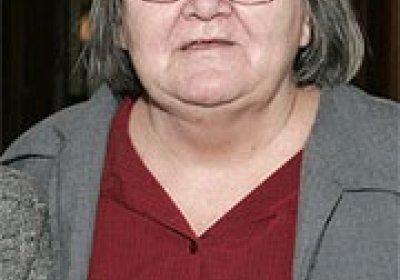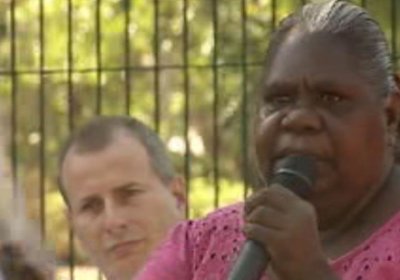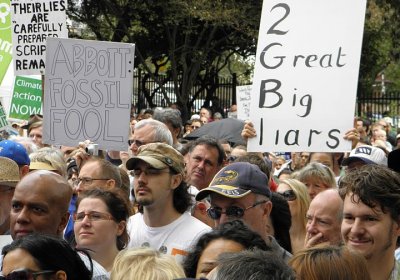A poll by Roy Morgan Research several days into the Fukushima nuclear crisis found that 61% of Australians oppose the development of nuclear power in Australia, nearly double the 34% who support it.
The growth in support for nuclear power over the past five years has been totally erased — and then some.
There was undoubtedly growing support for nuclear power until Fukushima, but the issue had been the subject of a great deal of hype and spin.
Australia
One hundred and thirty people packed out a room in the Crowne Plaza hotel to hear traditional owners and nuclear experts call for the closure of the Ranger uranium mine in the world heritage-listed Kakadu national park.
Yvonne Margarula condemned the mine for its presence on land that is sacred to her people — the Mirrar people. “The promises never last,” she said. “But the problems always do.”
Transport Workers Union national secretary, Tony Sheldon, has condemned Qantas’s training of overseas strikebreakers after the company’s chief executive, Alan Joyce, admitted to the practice in media reports.
Sheldon said in an April 5 media release: “They really need to come clean on who they are training, who is doing the training and why it has to be done in secret in another country? Why are they hiding it around the other side of the world?
Nine Aboriginal people have sued Herald Sun columnist Andrew Bolt in Melbourne over four articles he wrote in 2009.
The court has heard the articles questioned the motives of “light” or “white-skinned” people who identified as Aboriginal.
The people taking the action under the Racial Vilification Act include activist Pat Eatock, former ATSIC chairperson Geoff Clark, artist Bindi Cole, academic Larissa Behrendt, author Anita Heiss, health worker Leeanne Enoch, native title expert Graham Atkinson, academic Wayne Atkinson and lawyer Mark McMillan.
Despite crisis levels of overcrowding, many urban Aboriginal communities have been denied federal funding for new housing. On March 18, ABC online said town camps around Darwin were not allocated any of the $1.5 billion in upgrades planned for Aboriginal communities.
For more than a week, Rupert Murdoch’s The Australian has been on the warpath against green and left “extremists”. It began by attacking the NSW Greens for supporting the global boycott, divestment and sanctions (BDS) campaign against Israeli apartheid. The Greens are organised in independent parties in each state, but the Murdoch flagship demanded that Australian Greens leader Bob Brown bring its most left-wing branch into line.
A vicious smear campaign against the Greens candidate for Marrickville Fiona Byrne in the NSW state election reveals just how worried the powers-that-be are about the prospect of the NSW Greens winning a lower house seat.
This smear campaign focused almost exclusively on the Greens pro-Palestine stand, in particular their support (along with ALP councillors) for Marrickville council’s decision to sign on to the global boycott, divestment and sanctions (BDS) campaign against Israel.
If the last federal election promised the beginnings of a break from the two-parties-for-capitalism electoral system that has plagued Australian politics for the last century, the March 26 NSW election seems to be a lurch in the other direction.
The Liberal-National Coalition won dominance of the Legislative Assembly and (with small right-wing parties) control of the Legislative Council because a large number of working-class voters punished the Labor party with a 13.5% swing in primary votes.
Former ABC journalist Jeff McMullen attacked the federal government’s intervention into Northern Territory Aboriginal communities as racist and harmful in a March 21 letter to indigenous affairs minister Jenny Macklin.
McMullen said Macklin had “not responded to the calls by an overwhelming majority of the Aboriginal leaders in … occupied communities to end the Intervention now”.
McMullen wrote in response to a letter Macklin sent him on March 2 that defended the intervention.
Manufacturer BlueScope Steel has been at the forefront of the campaign against the carbon price proposed by Labor and the Greens.
Chief Executive Paul O'Malley has argued it could spell “the end of steel manufacturing in Australia”; something the Opposition Leader Tony Abbott agreed with during a recent tour of BlueScope's steelworks in Port Kembla.
Both have said that a price on carbon would threaten the company's profitability and therefore force operations offshore in search of cheaper labour.
“Peace is not just the absence of violence; but the presence of justice,” Samah Sabawi, Palestinian-Australian writer, and co-author of Journey to Peace In Palestine, told an audience of about 80 people at the University of Queensland on March 31.
She was commenting after a showing of Michael Weatherhead’s excellent documentary Return to Gaza. The documentary is based on the journey of her brother, Fetah Sabawi, who returned to Gaza with his wife and child in 2006 to visit family members and set up a music school for young Palestinian refugees.
At the Bali Process summit held on March 30, immigration minister Chris Bowen and foreign affairs minister Kevin Rudd signed a “regional framework to prevent people smuggling” with 41 nations.
But they failed to bully East Timor into agreeing to an Australian detention centre on its soil.
Rudd said the agreement — ultimately intended to stop asylum seekers reaching Australia — “represents a significant win” for Australia. Bowen said it “lays a framework for further bilateral discussions” with East Timor.
- Previous page
- Page 838
- Next page











